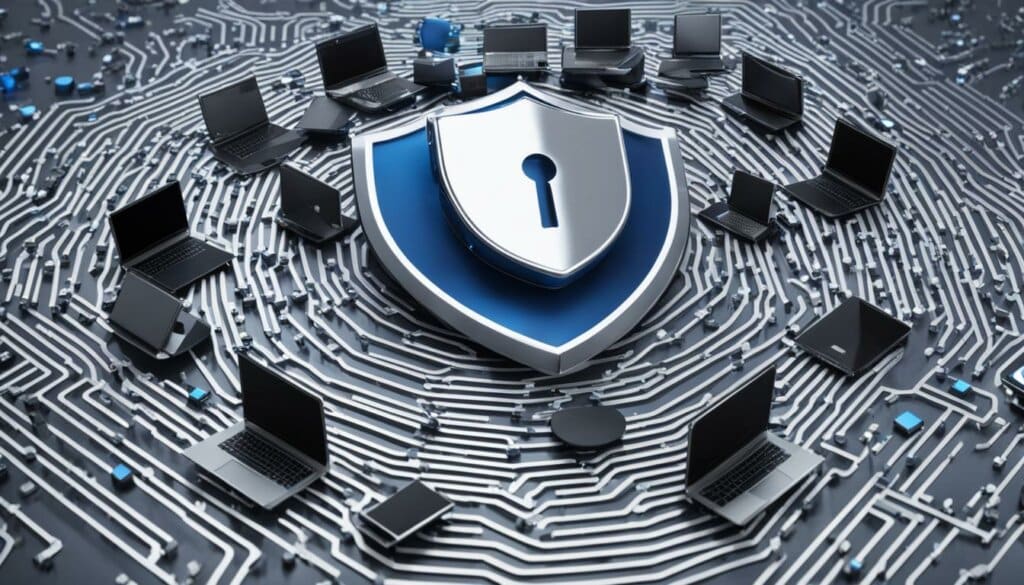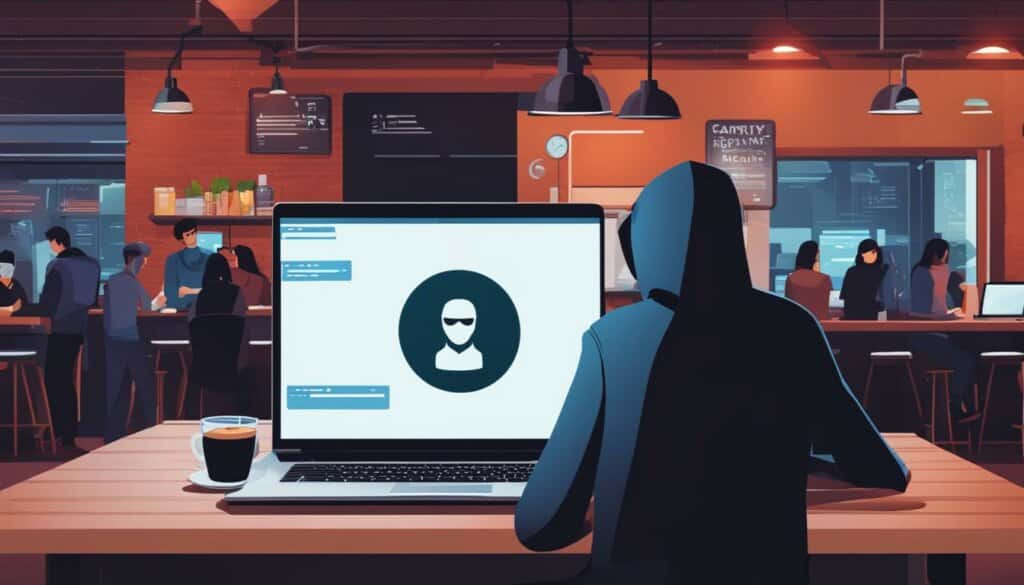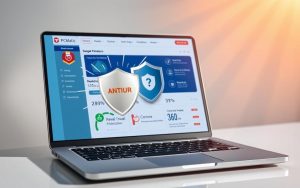Table of Contents
Welcome to our comprehensive guide on cybersecurity in the gig economy. As the gig economy continues to grow, it brings with it a range of cyber threats that need to be addressed to protect the flexible work environments of gig workers. In this article, we will explore the challenges faced by gig workers and provide valuable insights on securing gig workers and their valuable data.
In today’s digital age, the gig economy has become a global phenomenon, encompassing various industries and offering flexibility and independence to workers. However, this new way of working also opens the door to potential cyber threats. Gig workers handle sensitive client information, making them targets for cybercriminals. It is essential to understand the cybersecurity risks involved and take proactive steps to safeguard gig workers from cyber attacks.
In this article, we will delve into the world of the gig economy and explore the cybersecurity challenges it presents. We will discuss the rise of home working and the implications for cybersecurity, as well as the importance of prior preparedness and best practices for securing remote work environments. Furthermore, we will examine the role of gig workers in modern business practices and the advantages and risks of gig work.
As we look to the future of the gig economy, we will consider the cybersecurity challenges that lie ahead and the steps that need to be taken to mitigate these risks. We will also discuss the importance of user education and cybersecurity training for gig workers, as well as the legal and regulatory considerations that impact the gig economy.
In conclusion, safeguarding the gig economy from cyber threats requires a multi-faceted approach. By implementing cybersecurity best practices, providing education and training, and complying with legal and regulatory requirements, we can ensure the security and success of the gig economy while protecting the valuable data of gig workers and organizations.
Understanding the Gig Economy and On-Demand Workforce
The gig economy, characterized by short-term contracts and freelance work, offers flexibility and independence to individuals working on a project-by-project basis or as independent contractors. This labor market has experienced exponential growth in recent years, encompassing various industries beyond app-based driving, including highly skilled professionals in finance, IT, legal services, and more. With the global gig economy generating billions of dollars in revenue, it is crucial to understand the cybersecurity challenges that come with this flexible work environment.
In the gig economy, digital platforms connect companies with a pool of talented freelancers and independent contractors, allowing for agile and efficient work arrangements. While these opportunities bring benefits to both workers and organizations, they also pose cybersecurity challenges. Digital security and the protection of sensitive information become paramount in gig work, requiring robust measures to safeguard against cyber threats.
Ensuring digital security in gig work involves implementing strong passwords, utilizing two-factor authentication, and keeping software and devices updated. Secure network connections and encrypted communications are also essential to protect sensitive data. Gig economy platforms have a crucial role to play by implementing stringent security measures and regularly conducting security audits. Additionally, cybersecurity education and training are vital for gig workers to stay aware of emerging threats and enhance their cybersecurity skills.
The Cybersecurity Challenges in the Gig Economy
“The gig economy provides ample opportunities for flexible work, but it also brings cybersecurity risks that cannot be ignored.” – Cybersecurity Expert
As the gig economy continues to grow, cybersecurity challenges persist. Gig workers often have access to sensitive company information, making them potential targets for cyber attacks. Protecting data integrity and ensuring the confidentiality of client information become critical responsibilities for both gig workers and the organizations they collaborate with. By addressing these challenges head-on and implementing best practices, the gig economy can thrive while maintaining a secure work environment.
Cybersecurity Best Practices for Gig Work
Implementing cybersecurity best practices is essential for gig workers to protect themselves and their clients. In addition to strong passwords and two-factor authentication, gig workers should prioritize using secure networks and regularly updating their software and devices. Encrypting communications and being vigilant against phishing attempts are crucial for maintaining digital security.
Furthermore, gig economy platforms have a responsibility to prioritize cybersecurity. By implementing stringent security measures, conducting regular security audits, and providing cybersecurity education to gig workers, platforms can enhance the overall security of the gig economy.
| Key Cybersecurity Best Practices for Gig Workers |
|---|
| Use strong passwords and enable two-factor authentication |
| Keep software and devices updated |
| Use secure network connections |
| Encrypt communications to protect sensitive data |
The Rise of Home Working and Cybersecurity Implications
The Covid-19 pandemic has had a profound impact on the way we work, accelerating the adoption of home working and making it the standard advice for organizations. This shift to remote work has not only revolutionized the gig economy but has also highlighted the need for robust cybersecurity measures to protect sensitive data and information. Unfortunately, many organizations were ill-prepared for the sudden outbreak of home working, resulting in a surge of cyber threats targeting gig workers.
Gig workers, who often work from home, face unique cybersecurity challenges. They need to implement stringent cybersecurity measures to safeguard their data and protect themselves from cyber attacks. One of the key considerations is securing their home networks. Gig workers should ensure they have strong and unique passwords for their Wi-Fi networks, enable encryption, and regularly update their router’s firmware to address any security vulnerabilities.
In addition to securing their home networks, gig workers must also be cautious about phishing attempts that can compromise their sensitive information. They should be vigilant and skeptical of suspicious emails or messages, avoid clicking on unknown links, and verify the authenticity of any requests for personal or financial information. Implementing robust anti-malware software and regularly updating their devices’ software can also help protect against cyber threats.

Furthermore, gig workers should prioritize the use of virtual private networks (VPNs) when accessing work-related information or communicating with clients. VPNs provide an encrypted connection and help ensure the privacy and security of data transmitted over the internet. By utilizing a VPN, gig workers can protect their sensitive data from interception and unauthorized access.
As the gig economy continues to grow and home working becomes increasingly prevalent, it is imperative for gig workers to be proactive in implementing cybersecurity measures. By prioritizing data protection, staying informed about the latest cyber threats, and following best practices, gig workers can safeguard their digital assets and maintain the trust of their clients in the fast-paced and ever-evolving world of the gig economy.
Cybersecurity Best Practices for Gig Workers: Securing Remote Work Environments
Gig workers play a crucial role in the modern business landscape, providing their skills and expertise on a project-by-project basis. However, with the rise of remote work and the increased reliance on digital platforms, gig workers face cybersecurity challenges that need to be addressed. In this section, we will explore the best practices that gig workers can implement to secure their remote work environments and protect sensitive information from cyber threats.
Creating Strong and Unique Passwords
One of the fundamental cybersecurity practices for gig workers is to create strong and unique passwords for all their online accounts and platforms. A strong password typically consists of a combination of upper and lowercase letters, numbers, and special characters. Additionally, gig workers should avoid using common words, personal information, or easily guessable patterns in their passwords. It is also essential to use different passwords for each account to prevent a single security breach from compromising multiple accounts.
Implementing Two-Factor Authentication
Two-factor authentication (2FA) adds an extra layer of security to gig workers’ accounts by requiring a second form of verification, typically a unique code sent to their mobile device. By enabling 2FA, gig workers can reduce the risk of unauthorized access even if their passwords are compromised. Many platforms and online services offer 2FA as an option, and gig workers should take advantage of this feature to enhance their security.
Using Secure Networks and VPNs
When working remotely, gig workers should ensure that they connect to secure networks, preferably using a Virtual Private Network (VPN). A VPN encrypts internet traffic, making it difficult for cybercriminals to intercept and access sensitive information. By using a secure network and VPN, gig workers can protect their communications, data transfers, and online activities from potential threats.
Regularly Updating Software and Devices
Keeping software, operating systems, and devices up to date is essential for maintaining a secure remote work environment. Software updates often include patches for security vulnerabilities identified by developers, and by regularly updating, gig workers can ensure that they have the latest security measures in place. It is also essential to regularly update antivirus and firewall software to protect against emerging threats.
Encrypting Communications and Data
Gig workers should prioritize the encryption of their communications and sensitive data. Encryption converts data into a format that is unreadable without the appropriate encryption key, adding an extra layer of protection. Gig workers can use encrypted communication platforms, such as secure email services and messaging apps, to safeguard their conversations. Additionally, they should consider encrypting files and documents stored locally or in the cloud to prevent unauthorized access.
By following these cybersecurity best practices, gig workers can enhance the security of their remote work environments and protect themselves from cyber threats. In an increasingly digital and interconnected world, staying vigilant and proactive in safeguarding sensitive information is essential for gig workers to thrive in the gig economy.
The Role of Gig Workers in Modern Business Practices
Gig workers play a crucial role in modern business practices, offering their diverse skills and expertise to organizations on a project-by-project basis. Whether it’s developing a marketing strategy, designing a website, or providing legal advice, gig workers bring valuable contributions to companies in a flexible and cost-effective manner. However, this increasing reliance on gig workers also introduces cybersecurity challenges that need to be addressed.
As gig workers collaborate with organizations, they often gain access to sensitive company information, such as client data, intellectual property, and financial records. This raises concerns about data breaches, unauthorized access, and potential cyber threats. Businesses must implement robust cybersecurity measures to protect their data assets when working with gig workers. This includes securing communication channels, implementing strong access controls, and regularly updating security protocols.
Additionally, gig workers themselves need to be aware of the cybersecurity risks they may encounter while working on various projects. They should prioritize the protection of their clients’ information by implementing best practices such as using secure network connections, encrypting data, and regularly updating their devices and software to prevent vulnerabilities.
Gig Economy Cyber Threats
The gig economy is not immune to cyber threats. Freelance work often involves the use of digital platforms, which can be vulnerable to hacking, data breaches, and other cyber attacks. This puts gig workers at risk of losing their personal information and compromising the confidentiality of their clients’ data. It is essential for gig workers to stay informed about the latest cybersecurity threats and adopt proactive measures to protect themselves and their clients.
“The gig economy presents unique cybersecurity challenges due to the nature of flexible work arrangements and the use of digital platforms. Businesses and gig workers must collaborate to develop strong cybersecurity practices and ensure the protection of sensitive information.”
By prioritizing cybersecurity in freelance work, both businesses and gig workers can mitigate the risks associated with cyber threats, safeguard sensitive information, and maintain the integrity of the gig economy as a whole.
| Gig Economy Cyber Threats | Gig Economy Cybersecurity Measures |
|---|---|
| Data breaches | Implement strong access controls and encryption techniques |
| Hacking | Regularly update devices and software to prevent vulnerabilities |
| Unauthorized access | Use secure network connections and multi-factor authentication |
| Phishing attacks | Stay informed about the latest cybersecurity threats and adopt proactive measures |
Is the Gig Economy Worth It?
The gig economy offers numerous advantages for workers, making it an enticing option for those seeking flexibility and autonomy in their careers. Gig workers have the freedom to choose when and how they work, allowing for better work-life balance and the ability to pursue multiple income streams. Studies have shown that gig workers are generally more satisfied than traditional employees, as they have greater control over their schedules and work arrangements.
However, despite the benefits it provides, the gig economy also presents cybersecurity threats that need to be carefully considered. With the rise of remote work and the reliance on digital platforms, gig workers may be exposed to potential cyber attacks and the risk of sensitive client information being compromised. This highlights the importance of implementing robust cybersecurity measures to protect both the gig workers themselves and the data they handle.
“The gig economy offers great flexibility and the opportunity to work on diverse projects, which is perfect for individuals who thrive in a dynamic work environment. However, gig workers must be aware of the cybersecurity risks and take appropriate precautions to protect their clients’ data.”
It is crucial for gig workers to prioritize cybersecurity and stay updated on the latest threats and best practices. Implementing strong passwords, using two-factor authentication, and encrypting communications are all crucial steps to safeguard sensitive information. Additionally, gig workers should be vigilant in identifying and reporting potential phishing attempts, as well as using secure network connections when accessing client data.
| Advantages of Gig Work | Gig Economy Cyber Threats |
|---|---|
| Flexibility and autonomy in work | Potential exposure of sensitive client information |
| Better work-life balance | Risk of cyber attacks and data compromise |
| Opportunity for multiple income streams | Need for robust cybersecurity measures |

While the gig economy offers numerous advantages for workers, it is important to weigh these benefits against the cybersecurity risks involved. By taking the necessary precautions and implementing strong cybersecurity practices, gig workers can enjoy the flexibility and opportunities that the gig economy provides while protecting themselves and their clients from potential cyber threats.
The Future of the Gig Economy
The gig economy is projected to continue growing, with an increasing number of independent workers. The value of the gig economy is expected to reach billions of dollars in the coming years. However, along with its growth, there will be new cybersecurity challenges to address. The future of the gig economy depends on organizations and workers’ ability to adapt to these challenges and implement robust cybersecurity measures. It is essential to stay ahead of evolving cyber threats and ensure the protection of sensitive data in gig work.
Gig work brings many benefits, including flexibility and opportunities for workers, but it also introduces cybersecurity risks. As gig workers often handle sensitive client information, they need to prioritize cybersecurity to safeguard data and maintain the trust of their clients. Organizations that rely on gig workers must also implement stringent cybersecurity measures to protect their data and systems while collaborating with independent contractors.
To mitigate the cybersecurity challenges in gig work, both gig workers and organizations should stay up to date with the latest cybersecurity trends and best practices. This includes implementing strong passwords, using two-factor authentication, securing home networks, keeping devices and software updated, and encrypting communications. Additionally, regular cybersecurity training and education for gig workers can enhance their awareness and preparedness against cyber threats.
In conclusion, as the gig economy continues to expand, it is crucial for gig workers and organizations to prioritize cybersecurity. By implementing robust cybersecurity measures, staying informed about emerging threats, and investing in cybersecurity training, the gig economy can thrive while ensuring the safety and protection of valuable data.

Securing the Gig Economy: Best Practices for Cybersecurity
The gig economy has revolutionized the way we work, providing flexibility and autonomy for gig workers. However, with this newfound freedom comes the responsibility to ensure cybersecurity in gig work environments. Implementing best practices is crucial to protect sensitive data and maintain the integrity of the gig economy. Here are some key cybersecurity measures that gig workers and organizations should consider:
1. Strong Passwords and Two-Factor Authentication
One of the most basic yet effective cybersecurity practices is to use strong, unique passwords for all online accounts. This helps prevent unauthorized access to sensitive information. Additionally, enabling two-factor authentication adds an extra layer of security by requiring a second verification step, such as a code sent to a mobile device, before granting access.
2. Regular Software and Device Updates
Keeping software and devices up to date is essential for cybersecurity. Regularly updating operating systems, applications, and antivirus software helps protect against known vulnerabilities and security threats. It is also important to install security patches and firmware updates as soon as they become available to ensure optimal protection.
3. Secure Networks and Encrypted Communications
When working in the gig economy, it is crucial to use secure and encrypted network connections. Avoid connecting to public Wi-Fi networks, as they can be susceptible to data breaches. Instead, use trusted networks or consider using a virtual private network (VPN) to encrypt internet traffic. Additionally, encrypting communications, such as email exchanges or file transfers, adds an extra layer of protection to sensitive data.
4. Gig Economy Platform Security
Gig workers heavily rely on gig economy platforms to find work and collaborate with clients. It is important to choose platforms with robust security measures in place. Look for platforms that utilize encryption, have strong user authentication processes, and regularly update their security protocols. Prioritize platforms that provide clear guidelines on data protection and have a transparent approach to cybersecurity.
By implementing these best practices, gig workers can significantly enhance their cybersecurity posture and protect themselves and their clients from cyber threats. It is also essential for organizations to prioritize cybersecurity in the gig economy by providing gig workers with education and resources to stay updated on the latest cybersecurity threats and best practices.
| Best Practices for Gig Workers | Best Practices for Organizations |
|---|---|
| Use strong passwords and enable two-factor authentication | Educate gig workers on cybersecurity best practices |
| Regularly update software and devices | Implement robust cybersecurity measures on gig economy platforms |
| Utilize secure networks and encrypt communications | Conduct regular security audits and vulnerability assessments |
| Choose gig economy platforms with strong security measures | Establish clear data protection policies and procedures |
| Provide cybersecurity training and resources to gig workers |
The Importance of User Education and Cybersecurity Training
User education and cybersecurity training play a vital role in protecting the gig economy from cyber threats. As gig workers often work remotely and handle sensitive information, they need to be equipped with the knowledge and skills to identify and mitigate potential cybersecurity risks. Additionally, organizations that engage gig workers should provide comprehensive cybersecurity training to ensure the protection of their data and maintain a secure work environment.
By educating gig workers on cybersecurity best practices, such as identifying phishing emails, using secure network connections, and protecting sensitive information, they can become the first line of defense against cyber threats. This education should include regular training sessions and updates on emerging threats to keep gig workers informed and vigilant.
Organizations should take responsibility for providing cybersecurity training and resources to gig workers. This includes offering guidance on secure work practices, such as using strong passwords, encrypting communications, and keeping devices and software up to date. By investing in cybersecurity training, organizations can foster a culture of security and empower gig workers to protect themselves and their clients from cyber attacks.

In conclusion, user education and cybersecurity training are essential components of maintaining a secure gig economy. By equipping gig workers with the necessary knowledge and skills, organizations can enhance the overall cybersecurity posture of the gig economy. With proper training and awareness, gig workers can play an active role in safeguarding sensitive data and mitigating cyber threats, ensuring the long-term viability and security of the gig economy.
Legal and Regulatory Considerations in the Gig Economy
The gig economy operates within legal and regulatory frameworks that vary across jurisdictions. Data protection and privacy regulations play a crucial role in determining the responsibilities of gig workers and organizations in safeguarding sensitive information. Compliance with cybersecurity regulations is essential for gig workers to avoid legal penalties and reputational damage. It is important for gig workers to be aware of the specific legal requirements in their respective countries and ensure they implement appropriate data protection measures.
Gig workers should prioritize the protection of personal and client data by implementing secure communication channels, strong passwords, and encryption techniques. Additionally, gig workers should familiarize themselves with the relevant data protection laws and regulations, such as the General Data Protection Regulation (GDPR) in Europe. Understanding these regulations will help gig workers comply with legal requirements and protect the privacy of their clients.
Organizations that engage gig workers should also take steps to ensure compliance with cybersecurity regulations. They should establish clear data protection policies and procedures that outline the responsibilities of both the organization and gig workers in protecting sensitive information. Organizations should conduct regular data protection audits to identify any vulnerabilities and address them promptly. By prioritizing cybersecurity and complying with legal and regulatory frameworks, organizations can maintain the trust of their clients and safeguard their reputation.
Key Legal and Regulatory Considerations in the Gig Economy:
- Compliance with data protection and privacy regulations relevant to gig work
- Understanding the specific legal requirements in different jurisdictions
- Implementing secure communication channels and encryption techniques
- Establishing data protection policies and procedures
- Conducting regular data protection audits
By adhering to legal and regulatory requirements, gig workers and organizations can demonstrate their commitment to cybersecurity and protect themselves and their clients from potential data breaches. Taking proactive measures to ensure data protection in the gig economy will contribute to a more secure and resilient digital environment for all stakeholders involved.
| Country | Data Protection Regulation |
|---|---|
| United Kingdom | General Data Protection Regulation (GDPR) |
| United States | California Consumer Privacy Act (CCPA) |
| Australia | Privacy Act 1988 |
| Canada | Personal Information Protection and Electronic Documents Act (PIPEDA) |
| European Union | General Data Protection Regulation (GDPR) |
Conclusion
The gig economy offers flexibility and opportunities for workers, but it also presents cybersecurity challenges. Gig workers and organisations must prioritise cybersecurity to protect sensitive data and ensure the integrity of gig work environments. Implementing best practices, providing cybersecurity education and training, and complying with legal and regulatory requirements are essential steps to safeguard the gig economy from cyber threats. By taking proactive measures, the gig economy can continue to thrive while maintaining the trust and security of its stakeholders.
FAQ
What is the gig economy?
The gig economy refers to a labor market characterized by short-term contracts and freelance work.
What types of workers are part of the gig economy?
The gig economy includes various types of workers, from app-based drivers to highly skilled professionals in industries such as accounting, finance, IT, and legal services.
How much revenue does the gig economy generate?
The global gig economy generates billions of dollars in revenue.
What are the cybersecurity challenges in the gig economy?
The gig economy presents cybersecurity challenges, such as digital security and protecting sensitive information in gig work.
What is the impact of the Covid-19 pandemic on cybersecurity in the gig economy?
The pandemic has highlighted the need for cybersecurity measures in remote work environments, including for gig workers who often work from home.
How prepared were organizations for home working in terms of cybersecurity?
Many organizations lacked adequate cybersecurity measures for home working, particularly in areas like user education and awareness.
What are the cybersecurity risks when working with gig workers?
Gig workers may have access to sensitive company information, posing potential cybersecurity risks for businesses.
Are gig workers satisfied with gig work?
Studies have shown that gig workers are generally more satisfied than traditional employees.
What is the projected growth of the gig economy?
The gig economy is expected to continue growing, with its value reaching billions of dollars in the coming years.
What are the best practices for enhancing cybersecurity in the gig economy?
Best practices include implementing strong passwords, using secure networks, and encrypting communications.
How important is user education and cybersecurity training in the gig economy?
User education and cybersecurity training play a vital role in protecting the gig economy from cyber threats.
What legal and regulatory considerations exist in the gig economy?
Data protection and privacy regulations determine the responsibilities of gig workers and organizations in safeguarding sensitive information.
Source Links
- https://www.fieldengineer.com/article/gig-economy/
- https://www.ncbi.nlm.nih.gov/pmc/articles/PMC7434364/
- https://www.ifac.org/knowledge-gateway/contributing-global-economy/discussion/gig-economy-trends-and-impact-small-and-medium-practices









